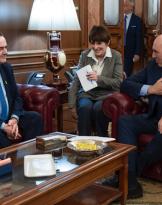The body of Don Gioacchino Rey returned today to Lenola where it was buried in the parish of Santa Maria Maggiore, welcomed by the ecclesial community that had seen him born on July 26, 1888. At the Eucharistic celebration officiated by the Archbishop of Gaeta, Monsignor Luigi Vari the Undersecretary of State for Defense, Domenico Rossi, participated. Also present was the mayor Andrea Antogiovanni and representatives of civil and military institutions.
Don Gioacchino Rey, the "priest of the resistance": a life spent to help others in the name of a charity understood as the highest form of faith exercise.
"A community that does not keep its historical memory alive is destined to lose its identity"Said Undersecretary Rossi, expressing a plot for the parish community's initiative to offer don Rey a privileged burial in the church where he received baptism.
The undersecretary, speaking at the civil commemoration, recalls the figure of Don Gioacchino Rey for what happened during the roundup of the Rome quarter "Quadraro" when, after offering himself to the Germans as a hostage in place of his parishioners, he spent days as a shuttle between the families from the looted neighborhood and the cinema studios of Cinecittà, where the rakes had been temporarily collected, to bring them information and messages from relatives, as well as support and comfort, being beaten by the Germans on several occasions. In the misfortunes of an Italy abandoned to itself after the 8 in September 1943 and occupied by the Nazis, Don Gioacchino succeeded in getting rid of figures like the conduit doctor and the pharmacist, useful to meet the care needs of the inhabitants of the area.
For this reason the president of the Republic Mattarella granted him the gold medal for civil merit for the help he gave to the wounded in the bombings of the Second World War.
Pius XII called him don Rey also "Priest of the trenches" for his exercise as military chaplain, during the Great War, for which he was also awarded a bronze medal for military value.
"Today, as then, the military chaplain supports all men and women in uniform, lives among them"Concludes Rossi, highlighting the important role of military chaplains who"they wear that uniform that 'uniforms' them to other soldiers, highlighting the communion of values. An even more important contribution if one thinks of the assistance given to the staff employed in the various operating theaters: men and women also subjected to considerable risks, not only physical stress, with problems deriving from a long and repetitive absence of their families."












